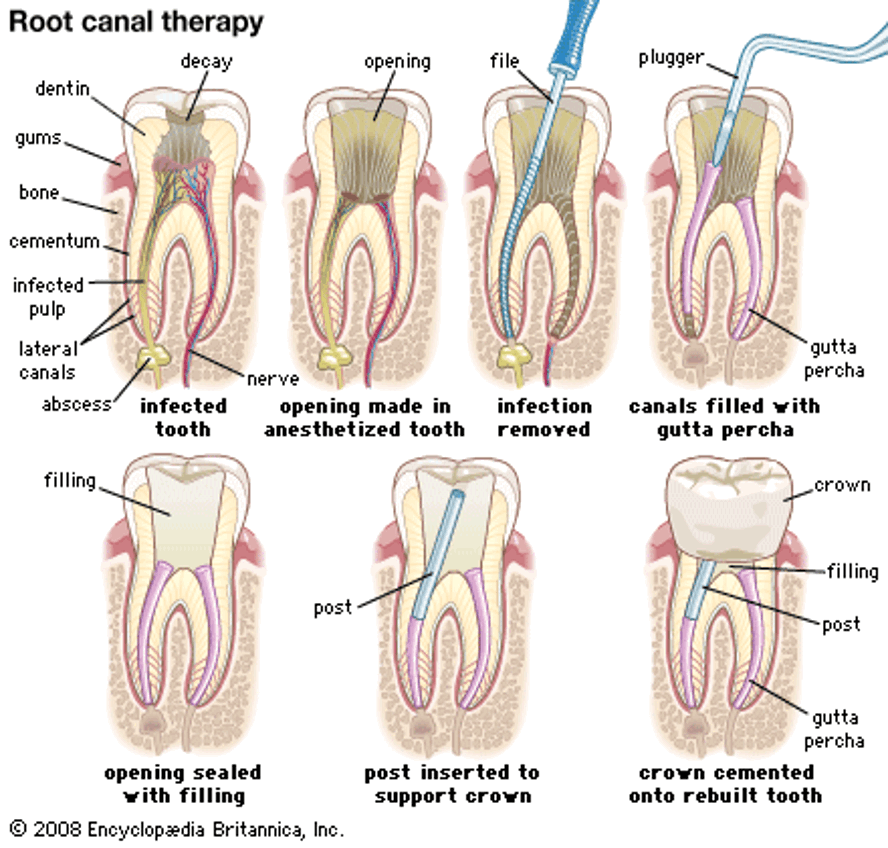When you hear the words, “You need a root canal”, you are often gripped with fear and anxiety. The inside of your hands become clammy and the feeling of dread overcomes you.The response is usually, “I don’t want a root canal, doc. I hear people have problems with them.”
Unfortunately, root canals have gotten a bad name. A root canal is often the best treatment to save a particular tooth. In this issue we will discuss Root Canal treatment.
What is a root canal?
A root canal is a procedure where the dentist prepares the inside of a tooth just like they would do to restore with a filling. The preparation extends to the pulp chamber where the nerve and blood supply is located and the toxins are removed. This procedure is called Endodontics. The word “Endo” is Greek for “inside”, meaning performing the procedure to remove bacteria and dead tissue from the inside of the tooth. After removal of the toxins, the canals are filled and sealed with a stable filling material called gutta percha. If all of the exit points at the ends of the roots are properly sealed, then the root canal is deemed successful. The tooth can now live on for many years and remains useful to enjoy many healthy Bahamian meals.
That said, we live in a land where white sugar is plentiful in deserts and treats. As a result, many Bahamians are affected by tooth decay. When cavities go untreated or you don’t visit the dentist regularly, eventually the pulp or nerve chamber is violated. When the nerve is damaged, then our choices become limited to either remove the tooth or treat with a root canal. Root canals save teeth.
Immediately after the completion of the root canal the tooth should be covered and protected by a porcelain or ceramic crown in order to avoid fracturing of the now non-vital tooth.
How do you know if you need a root canal?
Root canals are caused by a deep cavity or a cracked tooth from trauma. Patients generally need a root canal when they notice their teeth are sensitive or painful particularly to hot and cold sensations.
There are a few symptoms that suggest a need for a root canal—
- Severe pain while chewing or biting
- Pimples or drainage through the gums
- A chipped or cracked tooth
- Lingering sensitivity to hot or cold
- Swollen or tender gums
- Deep tooth decay
- Tenderness of the tooth to touch and difficulty chewing
- Tooth discoloration (turns grey or dark)
- Tenderness in the lymph nodes
Why do root canals cause so much fear?
Unfortunately, past experiences and your perceptions based on hear-say contribute to the shaping of your opinions and expectations.
If you had a bad-experiences, I hope there’s a reasonable explanation for what happened to you. However, I have found that the overwhelming gossip about root canals is associated with hear-say or exaggeration. I admonish you to seek and learn the truth about root canals through your own research. Locate a dentist who has the knowledge, experience and empathy to serve your needs.
Teeth in the front of your mouth tend to be easy for the dentist to treat. However, posterior or back teeth are more difficult because of the number of small canals called accessory canals exist. Sometimes, the best treatment choice is a referral to an Endodontist (root canal specialist). Endodontist are uniquely trained to manage posterior teeth or challenging situations with root canals.
In conclusion, root canals work. As dentists, we too require root canals from time to time. We do so because they are necessary alternatives to avoid the early loss of a tooth.
The key to a successful root canal is the knowledge, experience and empathy of your dentist and the best technology to serve your needs.
So, don’t be fearful about roots canals. They save teeth and enhance the quality of your life.
Dr. Kendal V. O. Major is Founder and CEO of Center for Specialized Dentistry which is a comprehensive family dental practice operating in Nassau and Freeport. He is the first Bahamian Specialist in gum diseases and dental implants since 1989. He also is a certified Fast braces provider. His practice is located at 89 Collins Avenue, Nassau at (242)325-5165 or [email protected].






